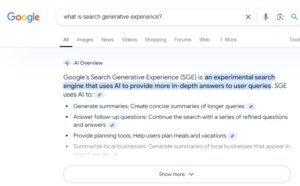Meta Platforms, the parent company of Facebook, Instagram, and WhatsApp, is venturing into the search engine space with the development of a new AI-driven search engine. This initiative aims to decrease Meta’s dependence on tech giants like Google and Microsoft, which currently dominate the search landscape and dictate much of the online information flow.
The Rationale Behind the Move
Meta’s decision to create its own search engine is fueled by a desire for greater independence and control over user experience. The tech landscape has been increasingly scrutinized for data privacy concerns, particularly in light of the controversies surrounding Meta’s handling of user data. By building an in-house search engine, Meta can tailor the search experience to its ecosystem, potentially offering a more privacy-conscious alternative to existing platforms.
Advanced AI Technology
At the core of Meta’s new search engine is the integration of advanced artificial intelligence capabilities. The platform is expected to employ sophisticated algorithms that understand user intent more effectively than traditional search engines. By analyzing vast amounts of user data while prioritizing privacy, Meta aims to deliver personalized search results that are contextually relevant to individual users.
Additionally, Meta’s experience with machine learning and AI in social media applications could provide a competitive edge. The company has already implemented AI-driven features in its platforms, such as content moderation and targeted advertising, suggesting it has the technical expertise to create a robust search engine.
Market Competition and Strategic Positioning
Entering the search engine marketplaces Meta in direct competition with established players like Google, which has an overwhelming market share, and Microsoft, known for its Bing search engine. Despite the challenges, Meta’s extensive user base and familiarity with data analytics could enable it to offer a unique value proposition.
However, the road ahead is fraught with challenges. Building a trustworthy and effective search engine requires not just technological innovation but also significant user trust—an area where Meta has faced scrutiny in the past. To counteract skepticism, Meta will need to demonstrate a strong commitment to user privacy and data security.
Future Implications for the Tech Landscape
If successful, Meta’s AI search engine could fundamentally alter the digital information ecosystem. It might encourage users to reconsider their search options and promote competition in a market that has long been dominated by a few key players. This move reflects a broader trend in the tech industry, where companies are increasingly investing in AI to enhance user experiences and create more personalized digital environments.
Moreover, Meta’s foray into search could have significant implications for advertising and content discovery. By integrating search capabilities with its social media platforms, Meta could create a seamless user experience that drives engagement and monetization opportunities.
In conclusion, Meta’s development of an AI search engine represents a strategic shift aimed at reducing reliance on established search giants. With a focus on personalization and user privacy, this initiative has the potential to reshape the online search landscape. As the project unfolds, the industry will be keenly watching how Meta navigates the challenges of trust, competition, and technological innovation.
Sources
-
“Meta Develops AI Search Engine to Lessen Reliance on Google, Microsoft.” The Information.
The Information -
“Meta’s New AI Search Engine: Aiming for Independence in Digital Space.” TechCrunch.
TechCrunch -
“How AI is Reshaping Search Engines.” Wired.
Wired -
“Data Privacy Concerns and the Future of Search.” The Verge.
The Verge -
“The Impact of AI on User Experience in Tech.” MIT Technology Review.
MIT Technology Review







